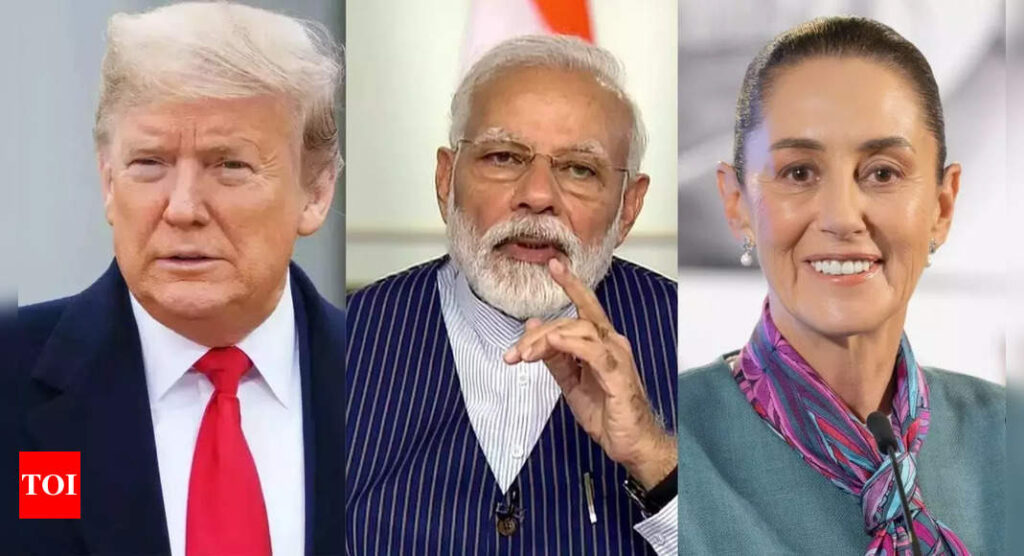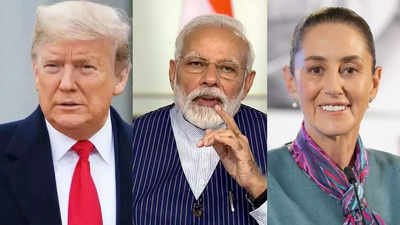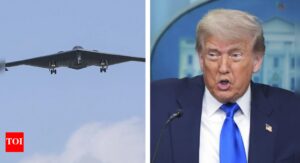Top 10 global leaders in 2025: Who holds more influence—PM Modi or President Trump? | World News

As 2025 progresses, global political landscapes continue to be shaped by prominent leaders. Public popularity plays a crucial role in assessing a leader’s effectiveness, with approval ratings serving as a key indicator of their resonance with citizens.
The approval ratings of the top 10 global leaders in 2025 highlight the diverse political and social dynamics influencing their countries. From Narendra Modi’s rising influence in India to the resilience of leaders like Claudia Sheinbaum in Mexico and Donald Trump in the US, the political stage is filled with figures who command strong loyalty while navigating complex challenges.
As the year unfolds, it will be intriguing to see how these leaders sustain their popularity and whether emerging political trends shift the global balance of power. Below is the list of the top 10 global leaders as of February 2025, based on the latest approval ratings.
List of top world leaders influencing 2025
Most prominent world leaders 2025
Narendra Modi (India)
Prime Minister Narendra Modi continues to lead the global approval ratings with an impressive 75% approval rating as per reports. Modi’s popularity remains robust not only within India but also internationally. Since assuming office in 2014, he has been known for his bold policy decisions, such as the controversial demonetization initiative, his push for a more digital economy, and significant steps towards making India a major player on the global stage.
Claudia Sheinbaum (Mexico)
In second place is Claudia Sheinbaum, the President of Mexico, who holds a 66% approval rating. Sheinbaum has built a reputation for her focus on addressing climate change, urban sustainability, and poverty. She became Mexico’s first female president and has garnered significant support for her progressive policies aimed at social justice, economic reform, and environmental sustainability.
Javier Milei (Argentina)
Javier Milei, the President of Argentina, ranks third with a 65% approval rating according to ET reports. A political outsider known for his unconventional style, Milei has shaken up the Argentine political establishment with his libertarian views. His presidency focuses on reducing inflation, cutting government spending, and making drastic reforms to Argentina’s economy.
Karin Keller-Sutter (Switzerland)
Karin Keller-Sutter, the President of Switzerland, holds fourth place with a 63% approval rating. Known for her calm and pragmatic approach to governance, Keller-Sutter has solidified her reputation as a steady and reliable leader in Switzerland. Her political career has focused on strengthening the country’s economy, promoting environmental policies, and maintaining Switzerland’s neutral stance in global geopolitics.
Donald Trump (United States)
Donald Trump, President of the United States, remains a controversial and influential figure, ranking fifth on the global approval ratings list with a 52% approval. His populist approach, focus on strong immigration policies, economic nationalism, and foreign policy decisions such as withdrawing from the Paris Agreement and renegotiating trade deals, all contributed to his high levels of support during his tenure.
Anthony Albanese (Australia)
Anthony Albanese, the Prime Minister of Australia, holds a 46% approval rating, placing him sixth on the list. Albanese, a member of the Australian Labor Party, became prime minister in 2022. His government has focused on tackling climate change, promoting Indigenous rights, and addressing economic inequality.
Dick Schoof (Netherlands)
Dick Schoof, the Prime Minister of the Netherlands, ranks seventh with a 42% approval rating. Schoof, who has been in power for several years, is known for his commitment to social welfare and economic policies aimed at improving the quality of life for the Dutch population. Despite facing significant domestic challenges, including issues related to immigration, housing, and the environmental impact of the country’s agricultural practices, Schoof has maintained a significant degree of influence both in his home country and within the European Union.
Donald Tusk (Poland)
Donald Tusk, the Prime Minister of Poland, also holds a 42% approval rating, placing him in eighth position. Tusk, a seasoned political figure, has had a long career in European politics, including serving as the President of the European Council. As Poland’s leader, he has prioritized economic growth, democratic values, and strengthening Poland’s position within the European Union.
Giorgia Meloni (Italy)
Giorgia Meloni, Italy’s Prime Minister, ranks ninth with a 42% approval rating. Meloni, known for her right-wing political stance, has gained significant support for her tough stance on immigration and her commitment to Italy’s traditional values. Her leadership has been marked by an emphasis on national sovereignty and economic reform, alongside a focus on Italy’s role within the European Union.
Ulf Kristersson (Sweden)
Rounding out the top 10 is Ulf Kristersson, the Prime Minister of Sweden, with a 38% approval rating. Kristersson, who assumed office in 2022, leads a center-right government. His leadership has focused on issues like national security, economic stability, and integration with the European Union.
Also Read | Top 20 richest families in Asia 2025: Mukesh Ambani leads; followed by key Indian and Asian business empires







